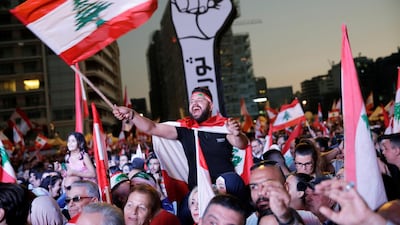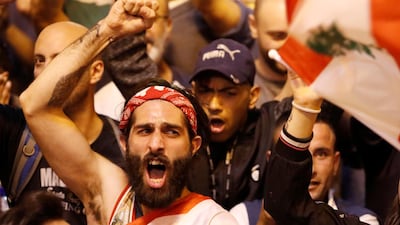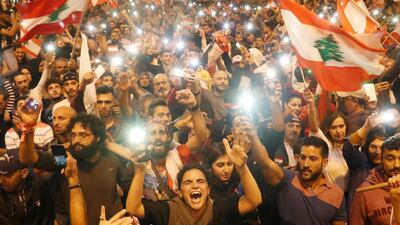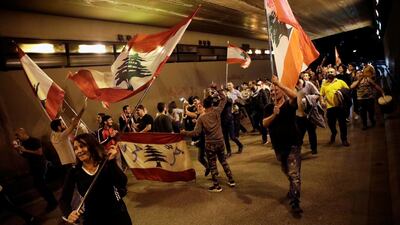Hundreds of thousands of Lebanese citizens have been taking to the streets since October 17 to express anger at their sectarian leaders, raising the cedar flag in a show of national pride.
The protesters are from across the country’s sectarian divides but they are largely united behind one main aim: ousting the political establishment that has ruled the country since 1990, when the 15-year civil war ended.
Civil groups and cross-sectarian parties who began mobilising in the early days of the nationwide movement are now looking to the future of the country.
About 60 groups, including political movements and civil groups, some of which emerged during the 2015 protests sparked by a waste crisis, have been meeting in various hotels in Beirut for the past weeks to form a common front.
The resignation of Prime Minister Saad Hariri last Tuesday in response to the demands of the people was hailed as a first victory.
But there is awareness about the need to look past this milestone to what comes next, given that the other leaders, including the president and the speaker of parliament, are unlikely to step down.
Naming a new prime minister is set to be the next turning point for the protesters.
President Michel Aoun must hold binding consultations with political parties to nominate a prime minister-designate, who will then have to form a Cabinet to be approved by Parliament.
But until then, the country remains without a functioning government.
Traditional parties back the idea of a techno-political government, installing ministers agreed on by parties to represent them, but who have the experience, qualification and mandate to work on fixing poor public services and the dire economic situation.
But the protesters, who have been rallying behind the chant “all of them means all of them”, are demanding the resignation of all members of the traditional political class.
They are unlikely to accept a transitional government with Mr Hariri or any other sectarian leader at its helm.
“Why should we allow them to continue after they have proven themselves incapable of doing the work they were appointed to do?” asked Rania Masri, of the cross-sectarian party Citizens in a State.
In a country where political divisions run deep, rejecting the traditional establishment is easier than agreeing on an alternative.
“We know where we want to go, we just don't know how and with who," said Salim Adib, a professor at the American University of Beirut and member of the cross-sectarian Sabaa party.
From his party’s booth, one of many that have sprung up in Martyrs' Square since the start of the protests, Mr Adib said the groups taking part in discussions have found common ground on forming a technical administration.
This, they say, should consist of independent, unimpeachable experts.
As of Sunday afternoon, one name emerging as a possible candidate for the prime minister's post was that of Yasser Akkaoui, a well-known figure in corporate governance activism in the Middle East.
Mr Akkaoui is an expert in governance in the Middle East, a committee member of Human Rights Watch and the editor-in-chief of Lebanese economic weekly Executive Magazine.
While the groups engaged in the discussion can pass Mr Akkaoui’s name to Mr Aoun, there is no legal need for the president to heed their recommendation.
Only the talks with the main parties in Parliament are binding consultations.
Mr Aoun has offered to meet representatives of the protesters but there is still no leadership with wide backing who can speak for them.
Protesters have remained on the streets after Mr Hariri stood down, intent on keeping the pressure on the parties and the president to meet their demands.
They also want a new government soon in a country where the process can take months or years.
In Martyrs' Square, public debates are being held regularly to discuss the way ahead.
Some booths provide legal and psychological support, while others hand out food, water and copies of the Lebanese constitution.
WhatsApp groups have been set up as a way for protesters to co-ordinate and plan. An Instagram page and even an app have emerged to co-ordinate coming events.
One umbrella group that unites 36 civil groups, which emerged under the name of “co-ordination entity of the revolution”, listed among the main demands of the protesters the drafting a new, non-sectarian electoral law and then a general election.
The 1989 Taif Agreement ended the civil war and rebalanced power-sharing quotas between the country’s religious sects to help stabilise the war-torn country.
Under the agreement, only the first election after the conflict was supposed to be run on a sectarian basis before a non-religious law was agreed on. Thirty years later the law is still sectarian.
Many groups are now pledging to break away from this system and push the issue of a secular electoral law as the cornerstone for a new, non-sectarian state.
Another pressing demand is the restitution of public funds said to be embezzled by the political establishment, which many believe would lift Lebanon’s ailing economy.
This is a cause that many political parties across the spectrum claim to champion, but a dedicated minister for combating corruption appointed by the last Cabinet was unable to carry out his task because of political interests.
Gina Chammas, a former president of the Syndicate of Certified Accountants and head of the American Anti-Corruption Institute in Lebanon, is among the experts holding meetings to discuss ways in which the new government could enforce accountability.
Ms Chammas says there are plans to form a government body to investigate corruption allegations.
"We will appoint experts in collecting evidence on the actions and networks of those accused of corruption," she told The National.
There have long been accusations that international organisations have also allowed or not rigorously ensured transparency in development projects.
Some internationally funded infrastructure projects, from water treatment to waste-sorting plants, have been built but never opened, or were closed not long after the ribbon was cut.
Ms Chammas said the investigations would not spare international organisations, including the UN and the World Bank, and assess whether they “participated in fuelling corruption".
“No one will get away with it,” she said.










